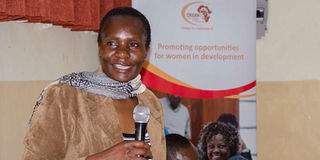Make political parties comply with gender rule by footing bill

National Gender and Equality Commission chairperson Winfred Lichuma addresses various government officials during an anti-gender based violence workshop in Isiolo town on December 7, 2016. The Constitution demands that a third of all elective and appointive positions be occupied by women.
PHOTO | VIVIAN JEBET | NATION MEDIA GROUP
What you need to know:
- Nominations to the Legislative Council (LegCo) were used to tap resourceful people who may not have been on the ballot.
- Leaders have turned nominations into avenues of rewarding loyalty across party rank and file.
The conclusion of every general election is always awaited by two anxious parties: The candidates and the nominees in political party lists.
The Constitution provides that no elective body shall have more than two-thirds of either gender serving without representation of the other gender.
Similarly, it demands that a third of all elective and appointive positions be occupied by women.
NOMINATION
The Gender and Equality Commission, chaired by Ms Winfred Lichuma, is mandated to actualise this requirement.
But why have the latest nominations to the Senate, National Assembly and County Assemblies failed this test, in the eye of an angry public?
Nominations to the Legislative Council (LegCo) — in existence from 1907 to 1963, when Kenya attained Independence — were used to tap resourceful people who may not have been on the ballot.
This was an opening that our Founding Fathers needed in their assaults on the colonialists, who used collaboration for effective administration with collaborators well rewarded.
PARTY LOYALTY
Earlier, nomination to the LegCo was done by the colonialists to stem, manage and curb mounting resistance.
Fast forward to post-colonial times and leaders have turned nominations into avenues of rewarding loyalty across party rank and file.
That is how Kariuki Chotara, Mulu Mutisya, Joseph Kamotho, Grace Mwewa, Catherine Nyamato, Zipporah Kittony and several others across the country found themselves in Parliament.
The trend has progressed — albeit with slight changes as to the justification and criteria.
Ultimately, however, it boils down to one thing: Loyalty.
JUBILEE GOVT
Amid this, the 2010 constitutional threshold on gender equity and equality is far from being achieved.
To its credit, the Jubilee administration under President Uhuru Kenyatta has embraced the threshold whole-heartedly.
That is reflected in its support for the Lichuma Commission; composition of the 2013 Cabinet; appointment of Principal Secretaries and heads of State corporations; the progressive 30 per cent rule on government tenders being set aside for women, youth and disabled and other initiatives.
The 10th Parliament never attempted to give effect to the Constitution’s gender provisions and requirements, abandoning the hot potato to its successor, who made half-hearted attempts through a gender parity Bill that was poorly crafted and destined to fail.
The Bill never garnered the requisite two-thirds vote.
Other efforts by gender activists, organisations and some well-meaning political leaders bore no fruit.
ELECTION
A High Court judgment for dissolution of Parliament following a petition against its unconstitutional composition and failure to enact the relevant gender law had no effect.
In the 2017 General Election, only a few women made it to elective posts.
Kenyans need to elect at least 16 female senators to avoid nominations.
The story is the same in the National Assembly and worse in County Assemblies.
As we congratulate Governors Anne Waiguru (Kirinyaga), Dr Joyce Laboso (Bomet) and Charity Ngilu (Kitui) on their election, we must not forget that the number of female deputy governors has reduced from nine in 2013 to seven.
EXPENDITURE
This year, 599 women were nominated to the 47 County Assemblies.
Ward representatives enjoy a Sh2 million car loan and Sh3 million mortgage while operational budgets run into millions of shillings in servicing the huge number of nominated MCAs.
Knowing that the 12th Parliament might not enact the gender law, we should shift the burden of expenditure on nominated individuals — in whichever House — to political parties.
Parties that fail to comply with the two-thirds gender rule during nominations for elective posts should be denied not just Treasury funding but also money that would have gone into paying nominated leaders.
Mr Burugu, a devolution and governance expert, was Nyandarua County’s first director of intergovernmental relations. [email protected].




